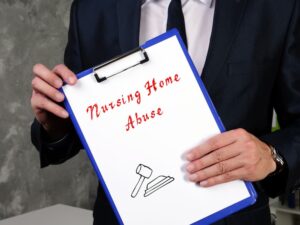Most Common Reasons Nursing Home Abuse Occurs
Abuse and Neglect, Nursing Home Abuse, Personal InjuriesNursing home abuse is a serious issue that impacts thousands of families each year. When a loved one requires round-the-clock care, families entrust nursing homes to provide that care safely and compassionately. Unfortunately, this isn’t always the case. Nursing home abuse can take many forms—including physical, emotional, sexual, and financial—and results in devastating consequences for residents who are often vulnerable and unable to defend themselves. Recognizing the reasons why nursing home abuse occurs can help families protect their loved ones and seek justice if abuse has taken place. Even more importantly, hiring a compassionate Charleston nursing home abuse attorney is in their best interest.
Understaffing and Overworked Staff
 One of the most significant contributors to nursing home abuse is understaffing. Many nursing homes operate with a limited number of caregivers, meaning the existing staff often take on additional responsibilities. When facilities are understaffed, caregivers are stretched too thin, making it challenging to meet the basic needs of all residents, let alone provide high-quality care. This situation can lead to neglect, as caregivers may skip routine tasks like hygiene maintenance, feeding, and administering medications, which can compromise a resident’s health and safety.
One of the most significant contributors to nursing home abuse is understaffing. Many nursing homes operate with a limited number of caregivers, meaning the existing staff often take on additional responsibilities. When facilities are understaffed, caregivers are stretched too thin, making it challenging to meet the basic needs of all residents, let alone provide high-quality care. This situation can lead to neglect, as caregivers may skip routine tasks like hygiene maintenance, feeding, and administering medications, which can compromise a resident’s health and safety.
Overworked staff are also at a higher risk of experiencing burnout and frustration. Caregivers working long hours without adequate breaks can become fatigued, leading to errors in care or even taking out their frustrations on residents. Sadly, this frustration may escalate into physical or verbal abuse in some cases. For example, a caregiver feeling overwhelmed may respond to a resident’s repeated requests with hostility or aggression. While understaffing and overwork don’t excuse abusive behavior, they do create an environment where abuse is more likely to occur.
Additionally, understaffed facilities often have fewer supervisors available to oversee caregiving staff. This lack of oversight reduces accountability and can lead to abusive actions going unnoticed or unreported. Families should be aware of the staffing levels at any nursing home facility they consider and ask about the staff-to-resident ratio to ensure enough caregivers provide attentive, compassionate care.
Lack of Proper Training
Providing care to elderly individuals, especially those with dementia or other health concerns, requires specialized skills. Proper training is imperative for nursing home staff to recognize and respond to residents’ unique needs. Unfortunately, many facilities fail to invest in adequate employee training programs, increasing the risk of unintentional harm or neglect.
Without proper training, caregivers may not know how to handle challenging behaviors from residents, which can lead to frustration and a greater likelihood of abusive reactions. For instance, a caregiver without training in de-escalation techniques may respond aggressively to a resident’s outburst instead of using calming strategies. Similarly, an untrained caregiver may neglect to follow protocols for administering medications or handling emergencies, putting residents’ lives at risk.
Training programs that cover areas like recognizing the signs of abuse, communicating effectively with residents, and understanding the medical needs of elderly individuals are essential. When facilities neglect to provide this training, residents suffer from inadequate care and are at a higher risk of abuse and neglect.
Poor Management and Supervision
Strong management is imperative in any healthcare facility, especially in nursing homes. Adequate supervision helps create a safe environment by enforcing policies, monitoring caregiver performance, and encouraging a culture of accountability. However, when management is weak or lacks organization, it sets a tone that can lead to a culture of neglect or even abuse.
In some cases, poor management allows problematic behaviors to become normalized. For instance, if supervisors turn a blind eye to inappropriate or abusive behavior, it can lead to an atmosphere where staff feel they can act with impunity. Facilities with ineffective management may not have clear policies for reporting or addressing abuse, allowing incidents to go unreported.
Additionally, poor management often means that caregivers are not held accountable for their actions. Nursing homes with strong, proactive leaders are more likely to prioritize resident welfare, implement effective training, and monitor staff closely. Families should consider researching the management track record of any facility they’re considering to ensure that strong leadership and high standards of care are in place.
Inadequate Background Checks on Employees
 Hiring unqualified or dangerous individuals is a significant risk factor for nursing home abuse. Due to high turnover rates in the industry, some nursing homes rush the hiring process, sometimes skipping comprehensive background checks. This lack of screening can result in hiring staff members with a history of abusive or negligent behavior.
Hiring unqualified or dangerous individuals is a significant risk factor for nursing home abuse. Due to high turnover rates in the industry, some nursing homes rush the hiring process, sometimes skipping comprehensive background checks. This lack of screening can result in hiring staff members with a history of abusive or negligent behavior.
For example, a caregiver with a criminal record or a history of aggressive behavior may be employed without proper vetting, putting residents at risk. Background checks that include criminal records, employment history, and personal references are important for ensuring the safety of residents. In cases where background checks are skipped, nursing homes open the door to potential abuse by hiring individuals who may lack the temperament or qualifications to care for vulnerable adults.
Nursing home residents are often among the most vulnerable members of society, and they deserve to be cared for by trustworthy professionals. By neglecting to conduct thorough background checks, nursing homes are essentially gambling with the safety and well-being of their residents.
Isolation and Vulnerability of Residents
Isolation is another factor that increases the risk of abuse in nursing homes. Many residents have limited contact with friends and family members, especially if they have mobility or communication challenges. When residents are isolated, they may feel helpless and unable to reach out for help, even if they’re being mistreated.
Elderly residents with cognitive impairments, like dementia, face additional vulnerabilities. They may struggle to understand or articulate their experiences, making it difficult for them to report abuse. Caregivers may also assume that such residents won’t remember instances of abuse, making them easy targets.
Isolation is particularly dangerous because it allows abuse to continue unchecked. Family members who visit frequently and establish regular communication can serve as advocates for their loved ones.
High Turnover Rates Among Staff
The high turnover rate in the nursing home industry creates instability, which can lead to inconsistent care and a greater risk of abuse. When new staff members are regularly introduced, continuity of care is disrupted. This inconsistency means that residents may not form trusting relationships with caregivers, making it difficult for them to feel comfortable or safe.
New or temporary staff members may also lack the familiarity to provide tailored care for each resident, leading to mistakes, oversights, or neglect. Furthermore, high turnover rates can contribute to understaffing, causing remaining staff members to feel overworked and more prone to stress and frustration, sometimes leading to abusive actions.
To address this, nursing homes should prioritize retention by providing adequate support, training, and fair earnings for caregivers. Stability in staffing improves the quality of care and helps build trust between residents and caregivers.
Financial Exploitation Due to Access and Trust
 Financial abuse is a hidden but common form of nursing home abuse. Caregivers often handle residents’ money for everyday needs, and in some cases, this access is exploited. Elderly residents may be manipulated into signing documents, sharing financial information, or giving money to caregivers. Financial exploitation can have devastating effects on a resident’s life savings, especially if they’re unaware of the extent of the abuse.
Financial abuse is a hidden but common form of nursing home abuse. Caregivers often handle residents’ money for everyday needs, and in some cases, this access is exploited. Elderly residents may be manipulated into signing documents, sharing financial information, or giving money to caregivers. Financial exploitation can have devastating effects on a resident’s life savings, especially if they’re unaware of the extent of the abuse.
In some instances, financial abuse can be as simple as taking small amounts of money or personal items. Other times, it may involve coercing the resident into signing over assets or changing wills and powers of attorney. Families should monitor their loved one’s financial accounts for suspicious transactions, missing personal items, or sudden changes in financial behavior.
For residents with limited cognitive function, financial abuse is particularly harmful, as they may not understand the extent of their losses. Families should ensure that legal protections, such as financial oversight by trusted individuals, are in place to prevent exploitation.
Resident-to-Resident Aggression
While many assume abuse in nursing homes only comes from staff, resident-to-resident aggression is another serious issue. This type of abuse can occur when residents lash out due to mental health conditions, frustration, or discomfort in their environment. In facilities where there isn’t adequate supervision, incidents of resident-to-resident aggression can go unaddressed, leaving some residents vulnerable to harm.
For example, a resident with dementia may become physically aggressive if they feel confused or threatened. Without proper intervention, this behavior can endanger other residents. Nursing homes need policies in place to monitor interactions between residents, provide appropriate behavioral interventions, and ensure that caregivers can quickly de-escalate any altercations.
Failure to Recognize or Report Abuse
One of the reasons nursing home abuse continues is due to a lack of recognition or failure to report. Caregivers may fail to recognize signs of abuse or assume certain behaviors are “normal” in the context of caregiving, such as rough handling or restrictive measures. In some cases, staff may fear retaliation from colleagues or superiors if they report abuse, especially in facilities where management doesn’t prioritize resident welfare.
An environment that discourages reporting creates a culture where abuse can flourish. Nursing home facilities must have straightforward policies encouraging staff members to report concerns without fearing retaliation. Training on recognizing abuse and creating a culture of openness and accountability are necessary steps in preventing these issues from escalating.
Profit-Driven Motives
Some nursing homes prioritize profit over patient care. Facilities operating with a profit-driven mindset may cut corners in areas like staffing, food quality, amenities, or even essential health services. Such cost-cutting measures can create an environment where residents’ needs are not fully met, leading to neglect and, in some cases, abusive situations.
For instance, a profit-oriented nursing home might hire fewer caregivers to reduce labor costs, leading to overworked staff and increased stress levels. This can result in less attentive care, poor living conditions, and a higher risk of abuse or neglect. Residents in these facilities often lack proper nutrition, timely medical attention, and clean living spaces, all of which can negatively impact their quality of life and health.
Signs Your Loved One May Be Experiencing Nursing Home Abuse
Recognizing the signs of nursing home abuse can be challenging, especially if your loved one cannot communicate clearly. Common warning signs include:
- Unexplained injuries like bruises or fractures
- Sudden weight loss or malnutrition
- Poor hygiene or living conditions
- Withdrawal from social interactions or activities
- Behavioral changes such as anxiety, depression, or fearfulness
- Bedsores or other untreated medical conditions
- Unusual financial transactions or missing personal items
If you notice any of these signs, document your observations and bring them up with facility management or contact a legal professional who can help investigate further.
When to Contact a Nursing Home Abuse Attorney
 If you suspect abuse, consulting a nursing home abuse attorney is an important step in protecting your loved one’s rights and holding the responsible parties accountable. Here’s why an experienced attorney can make a difference:
If you suspect abuse, consulting a nursing home abuse attorney is an important step in protecting your loved one’s rights and holding the responsible parties accountable. Here’s why an experienced attorney can make a difference:
- Understanding Complex Laws: Nursing home abuse cases involve numerous legal and medical details. Attorneys with experience in elder law can help you understand the complexities of your case and advise on the best course of action.
- Evidence Gathering and Investigation: An attorney can conduct a thorough investigation, gather necessary documentation, interview witnesses, and collect evidence of abuse. It can include medical records, witness statements, and facility records.
- Advocacy and Protection of Rights: An attorney can advocate for your loved one’s rights, ensuring they receive safe and respectful care. They can help explore options like reporting the abuse, relocating your loved one, or filing a lawsuit.
- Seeking Compensation: Abuse can lead to significant damages, from medical bills and emotional trauma to loss of quality of life. A skilled attorney can help pursue compensation for these damages, helping your family cover costs and obtain justice.
- Promoting Change in the System: Legal action holds facilities accountable and can lead to improved practices, benefiting your loved one and future residents.
A Nursing Home Abuse Attorney Can Help
Nursing home abuse attorneys are dedicated to advocating for vulnerable residents’ rights. If you suspect your loved one is suffering from abuse or neglect, don’t wait to take action. Contact one for a free consultation, where they will review your case, discuss your concerns, and explain your options.
Together with your seasoned personal injury lawyer, you can work to protect your loved one from harm, hold abusers accountable, and restore dignity and respect to their lives. You don’t have to face this challenge alone—let an attorney help every step of the way.
Nathan Hughey, an attorney and fourth-generation South Carolinian, founded Hughey Law Firm in 2007. Before that, he spent five years defending nursing homes and insurance companies. Leveraging his experience, he now advocates for those injured or wronged by such entities, securing over $220 million in verdicts and settlements.
